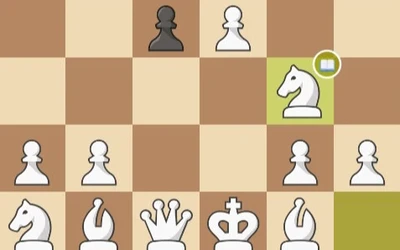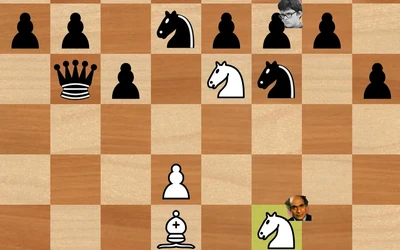
Spaced repetition opening moves - a good idea, or a really bad one?
... where I discuss my recent addiction to chess training sitesIntro
As you know, I have been developing the LiChess Tools browser extension, which is created for people who want to learn chess, for chess professionals and streamers. Any ideas about learning to play the game better is something I want to implement there.
So here I am, looking over some chess sites that are pretty cool. You get to choose a theme or opening or something, then use spaced repetition to improve in that area. Kind of like Duo Lingo for chess - which should have been a warning sign, since I've tried to learn languages with that thing and failed miserably.
And, a few Gotham years too late, I've decided to learn the Vienna Gambit. Ran through variations, again and again, learning the moves, trying to determine general principles or ideas, feeling pretty cool about myself. Finally I do some chess. So what's the result?
What happened
First of all, my memory has always been bad. Not only tiny, but also rebellious. If I repeat something 10 times, it suddenly goes "well, what if water weren't wet? Wouldn't that be exciting?" and randomly mixes up everything. But I carried on. I wasn't 100% there, but I felt pretty confident. I knew when to get the queen out, when to push pawns, when to pin knights and a few juicy traps.
But how does one test this? A normal human being would play some chess games with people. I've decided to play with the computer - some sites have this functionality where they play against you at different levels on the opening you are training on. And lo and behold. Not only did the computer not make the moves in the tutorial, even when it did that, it would then proceed to, you know..., play chess. And I would blunder queens and stuff.
Honestly, I felt I was doing better before I started to train. What was going on?
Hypothesis
I am pretty sure that getting on top out of the opening is a good thing, yet by memorizing moves and playing them over and over I've entered a "rhythm" that demanded the same kind of behavioral pattern even when I was getting out of book. And because I had to move at that pace, I was blundering like crazy..
But there is more. Sometimes I would force myself to think things through, then ending up blundering anyway. Well, I am a noob, but that was strange. And I think this was because I was trying to cram the position into the limited and rigid box of what I had learned during the training.
I don't know how it is for other people. I've seen people play 20-30 moves all prep, and those were noobs like me, so maybe this spaced repetition thing helps them, but for me it was like I was overfitting on a small dataset and then failing to generalize.
Intermezzo
How does this spaced repetition work? It's actually quite simple. Lichess studies can easily cover this. Lichess doesn't select the chapters for you based on how well you've done in playing others, but LiChess Tools does, albeit in a rudimentary fashion. I could transform it to work just like these websites, though, with relatively little effort.
The idea is:
- you "learn" by examining specific lines
- you "practice" by interactively making the moves and trying to get them all right
- the site is presenting you with the lines you messed up more and the ones you did well less
- eventually you can do puzzles or play with computer to find out how well you did
The problem and the solution
Problem is that this system encourages rote memorization. This might work in the beginning, maybe it could embed some of the basic principles of the theme in your subconscious if you're lucky, but that mostly depends on how your brain works, not the design of the web site or application.
I was mentioning Duo Lingo before. The best way to learn a language is to immerse yourself in it. Speak with people, no matter how badly, read, listen, watch, talk, write. Duo Lingo almost doesn't cover any of these. I feel like these chess learning platforms have the same issue. Perhaps immersing oneself in chess, just like with a language, might be the answer here as well.
I know what you're going to say. "Noob, I play chess a few hours every day and I can never get about X rating! Immersion doesn't help", but that's like saying "I am watching the same TV series all day long and I never learn the language". Well, it worked with German and Star Trek TNG for me, but I was a kid - and then I forgot it all, of course. Adults don't work this way. One has to vary the input and output. Play chess, but also puzzles, analyse your games, read chess books, analyse the games of masters, summarize, extract information from data, structure what you've learned and so on.
Maybe the best tool is to enter a chess community with people who are actually interested in the same thing! Lichess as a chess community is another issue I want to address, only not here. We should work on it more, though.
Anyway, I may be wrong. Someone could create courses which are thematic and principled, rather than opening repertoires. Memorizing general principles at work in different situations might actually be great and function within this system. I guess garbage in, garbage out.
Conclusion
I don't have a perfect solution yet. I do have some ideas, which I would be happy to discuss with all of you, but not sure which of them are good and which complete crap. So here is a small inexhaustive list:
- a more interactive "learn" functionality as above, which would be more effective than asking people to explore study chapters by themselves
- a human analysis tutor, which would guide you towards analysing your games without giving you the answers (this I think shows a lot of promise, but perhaps a limited target audience)
- qualitative studies over quantitative ones - I often generate thousands of moves in studies, yet failing to grasp the principles of what I am researching
- a dynamic exploration and checkpoint system, in which one would play - let's say with Explorer Practice - and be awarded when they find new variations, win checkpoints for areas they've covered extensively, basically playing chess as an RPG
- the king of them all, the one people have been requested for ages, a real chess tutor - this, I am afraid, is practically impossible. If it were doable, chesscom would have done, Lichess would have done it, I would have done it. Thing is, computers are still idiots. Really really fast idiots, but idiots nonetheless. They cannot teach you what they themselves do not know.
So far I've been pleasantly surprised how easy it is to emulate these - often paid - services with Lichess studies, interactive lessons and the extended functionality LiChess Tools provides. But there are new ideas out there and even for old ideas, nuances that merit research. I hope I will find the time and dedication to check out what other people have done and I am certain I am going to find some interesting new stuff.
What do you guys think? What's your favorite way of learning chess? How would you see it work on Lichess? Could it be automated or, the opposite, it would work only with human effort within a human community? I am eager to hear from you. Drop a comment!
You may also like
 thibault
thibaultHow I started building Lichess
I get this question sometimes. How did you decide to make a chess server? The truth is, I didn't. TotalNoob69
TotalNoob69Best opening for White after e4 e5 ?!
... people who know do, people who don't know write blog posts GM Avetik_ChessMood
GM Avetik_ChessMood10 Things to Give Up to Enjoy Chess Fully
Discover how embracing a lighter mindset can help you enjoy chess again and achieve better results. CM HGabor
CM HGaborHow titled players lie to you
This post is a word of warning for the average club player. As the chess world is becoming increasin… TotalNoob69
TotalNoob69Destroy the Caro Kann with style
... a beautiful line with a lot of lessons to impart FM MattyDPerrine
FM MattyDPerrine